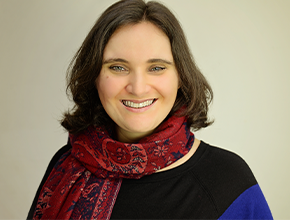A UK domestic violence researcher and Liverpool Hope University academic has delivered a successful training symposium for legal professionals in the United States.
Dr Emma Katz is a Senior Lecturer in Childhood and Youth at Hope.

She is a world leading expert in domestic violence and has conducted recent research into the harmful effects of ‘coercive control’ - where victims experience a pattern of repeated control and domination from a perpetrator - as well as how parental cyberstalking can have a devastating impact on children and young people.
Last month Dr Katz was an invited guest of the American National Family Violence Law Center, contributing to their newly developed training programme for professionals working in the family courts.
She addressed around 40 child and family investigators (CFIs) and parental responsibility evaluators (PREs) working within the family courts in the state of Colorado.
Dr Katz explains: “At the training, I explained how coercive control works as a form of abuse that enables perpetrators to entrap and dominate partners and children.
“I particularly examined the evidence surrounding male coercive control perpetrators as abusive fathers, the harms they do to their children, and how coercively controlling fathers often also subject their children to physical and emotional abuse and sometimes also sexual abuse.
“Finally, I explored how coercive control perpetrators usually continue to abuse after their partner has separated from them, how little protection there is for children whose coercive-control-perpetrating parent continues to harm them post-separation, and how the family court can act to protect these children by greatly limiting perpetrators’ contact with them or stopping it altogether.”
The training, which took place in December 2021, received excellent feedback from participants. One person, quoted in the Center’s newsletter, described it as “the best program I’ve attended in 41 years of practicing law”. The event organiser, the esteemed George Washington University law professor Joan Meier, described Dr Katz’s contribution as “powerful, clear, credible, and relevant”.
There are now plans for Dr Katz to be a staple part of the programme as it is rolled out to further US states in the near-future.

In November last year, Dr Katz argued that not enough is being done to protect the young victims of harmful parental cyberstalking.
Her study, published in the Journal of Gender-Based Violence, examined how ‘coercive control’ perpetrators - predominantly male - can stalk ex-partners in the digital world, using everything from social media to WhatsApp, following their partners attempting to escape from them by ending their marriage or relationship.
And Dr Katz said these control-obsessed fathers are also using tech to stalk youngsters - yet children are not always being recognised as victims or given the support they need.
She said: “Technology-facilitated abuse and stalking needs to be taken much more seriously as a crime. It’s part of a pattern of harmful behaviour which a perpetrator has typically been committing for years.
“And through the use of things like social media, the victims of domestic abuse and stalking - both adults and children - are living in constant fear and are subjected to intrusive surveillance.
“Relationships with children are being weaponised by abusive fathers in order to continue their campaigns of abuse, and police forces and family courts need to be awake to the dangers.”
The research saw Dr Katz and colleagues from the University of Lapland, Finland, analysing dozens of stalking cases dealt with by district courts in Finland between 2014 and 2017.
The researchers found stalkers used technology to be ‘omnipresent’, sparking ‘continual fear’ in both adult and child victims. The research uncovered cases where the perpetrator had systematically demolished a woman’s reputation on social media, while all the while presenting himself as the ‘good’ father.
In seven cases it was mentioned that the perpetrator had installed spy software in a woman’s or child’s mobile phone, affixed a spy device to a woman’s car, or used or threatened to use GPS data in tracking the woman and/or children.
Just 8 of 139 cases dealt with in the Finnish courts over a three year period comprised a female stalker and a male victim - in 131 out of 139 cases the stalker was male.
And, overall, the children were recognised by courts as an ‘injured party’ in only 13 of the 131 cases involving a male stalker.
The cyber harassment involved threats of violence and death, intrusive and obsessive fatherhood, as well as disparaging and insulting remarks about an ex-partner’s motherhood or womanhood.
The work concludes that ‘children’s exposure and vulnerability to fathers’, or father figures’, technologically-facilitated stalking of their mothers must be more widely recognised.’



